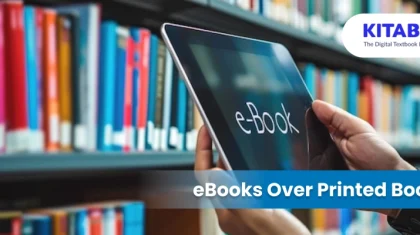
The Role of AI in Personalizing Learning Experiences Through eBooks
Summarize this blog with your favorite AI:
In the rapidly evolving digital landscape, the use of AI in eLearning and eBooks has developed a personalized and inclusive learning space for children in school.
It improves students’ learning outcomes and automates administrative tasks for teachers and educators. Due to its quick adoption and continuous advancement, the global market for AI in education is expected to reach $6 billion by 2025.
If you want to delve deeper into how AI transforms education, you’re in the right place. This blog will show how AI changes the game in education, making learning inclusive, adaptive, and accessible for all learners.
Table of Contents:
I. Personalized Learning with AI Through eBooks
II. How AI is Transforming eBook-Based Learning
III. Why Personalized Learning Matters in Education
IV. How AI Enhances Personalized Learning in eBooks?
- Tracking Learning Patterns with Analytics
- Continuous Feedback and Assessment Loop
- Supports Diverse Learning Needs
V. AI Tools That Help Educators Personalize Learning
- Smart Content Generators
- Intelligent Tutoring Systems
- AI-Powered Learning Management Systems
- Tools for Natural Language Processing
VI. Closing Thoughts
Personalized Learning with AI Through eBooks
eBooks and digital content have replaced traditional books due to their enhanced accessibility and flexibility. Additionally, with the integration of technology and AI in education, students are getting an opportunity to engage in a unique learning style.
An evident role of AI in personalized learning is creating interactive and engaging eBooks. AI platforms can now easily customize eBooks to match the learner’s learning needs, retention style, reading habits, past preferences, and more.
This adaptive learning approach ensures each student has access to a more effective and immersive learning experience.
How AI is Transforming eBook-Based Learning
AI-driven eBook-based learning can offer learners a rich multimedia experience. Interactive elements like animation, pop quizzes, videos, gamified simulations, etc., can also enhance the students’ retention power.
Additionally, if a student is struggling with a particular topic, AI in eLearning can be integrated to simplify learning to suit the student’s learning needs. AI can also help students clarify doubts quickly and smoothly by enabling real-time collaboration and feedback loops with teachers.
Such use of AI in eLearning can improve the learning pace and keep the students motivated and engaged.
Why Personalized Learning Matters in Education
Personalized learning addresses the fact that each student learns differently. This ensures that students get the specific guidance and support they require. By identifying the strengths and weaknesses of each student, teachers can provide appropriate learning resources to them.
Some more advantages of AI personalized learning in education are:
- Allows students to learn at their own pace
- Enhances student retention and engagement with the learning material
- Increased learning outcomes and academic performance
- Encourage students to explore their interests and hobbies
- Develops independent learning abilities and self-motivation in students
How AI Enhances Personalized Learning in eBooks?
Despite the numerous benefits of a personalized learning approach, it is challenging to implement in a traditional classroom setup with physical books and learning materials.
The integration of AI and digital technology in eBooks can go a long way toward offering tailored learning assistance to students, allowing them to grasp concepts quickly.
Below, we mention how personalized learning with AI goes beyond the limitations of traditional classrooms to create a dynamic and interactive learning environment.
1. Tracking Learning Patterns with Analytics
Teachers and educators can track student performance through AI-generated analytics and adjust their teaching approaches accordingly.
By closely observing how students engage with the learning material and perform, AI in education can automatically identify customized approaches for each student and notify teachers to intervene.
This collaborative, data-driven teaching strategy makes it possible to offer proactive support and targeted instruction, ensuring that each student receives the assistance they need to succeed.
2. Continuous Feedback and Assessment Loop
AI can work with a large amount of data at once, allowing teachers to quickly provide feedback to students after assignments, tests, and quizzes.
AI in education also enables error analysis, in which AI identifies mistake patterns for each student, provides specific feedback, and helps them learn from their errors.
Additionally, AI tools also enable an ongoing assessment loop, giving students frequent chances to track their progress and identify areas of improvement.
3. Supports Diverse Learning Needs
Approximately 240 million children globally have some form of disability related to cognitive functioning and psychological well-being. This makes it important to ensure that the educational landscape is well-equipped to cater to their diverse learning needs.
AI in eLearning offers tools, such as speech-to-text, text magnification, screen reading, and more, that can create a more inclusive and personalized learning environment.
AI also provides personalized learning paths and adjustments to accommodate neurodiverse students, helping them engage with material in a way that suits their needs.
AI Tools That Help Educators Personalize Learning
Several AI tools are available today that help educators personalize learning through eBooks. Some of these include:
1. Smart Content Generators
These resources assist teachers in producing interactive and flexible eBook content. To improve engagement, they enable the use of multimedia components, including simulations, films, and tests.
2. Intelligent Tutoring Systems (ITS)
ITS applies AI in education to give students personalized teaching that is customizable to their preferences and learning speed. They also offer prompts and instant feedback, hence enhancing the learning process.
3. AI-Powered Learning Management Systems (LMS)
Many LMS platforms now incorporate AI in eLearning for customized learning routes, monitor student progress, and provide data analytics to comprehend students’ learning preferences and difficulties.
4. Tools for Natural Language Processing (NLP)
NLP tools assess the written assignments of students and issue personalized feedback that gives instructors the ability to better individualize their instruction and assessments in language-based courses.
Closing Thoughts
It is safe to say that using AI in eLearning is very beneficial. As AI continues to advance, eBooks will play a pivotal role in transforming education, making learning more inclusive, adaptive, and accessible for all students.
If you are also in the educational landscape and want to know more about AI in e-learning and publish your eBooks, with us at KITABOO. We are a digital textbook platform and can assist you with enhancing and distributing immersive experiences to educators and students securely and at scale.
To know more about how you can implement AI for adaptive learning, request a demo with us today!
Also check:
Digital Textbook Platform for K12 Publishers
Digital Textbook Platform for Associations & Societies
Digital Textbook Platform for Trade Publishers
FAQs
AI personalizes eBooks by analyzing learner data such as reading habits and engagement levels. It adapts the content to match individual learning styles, suggesting resources, customizing quizzes, and adjusting difficulty levels to suit each learner's needs.
Personalized learning through AI enhances engagement, retention, and accessibility. It allows learners to move at their own pace and fill particular knowledge gaps while providing timely, evidence-based evaluations to improve the learning process.
Educators can use artificial intelligence-based tools such as Learning Management Systems and Intelligent Tutoring Systems to assess learners' performance, construct adaptive content, and provide assistance. These tools also streamline lesson planning and help create effective individual learning spaces.
Discover how a mobile-first training platform can help your organization.
KITABOO is a cloud-based platform to create, deliver & track mobile-first interactive training content.


